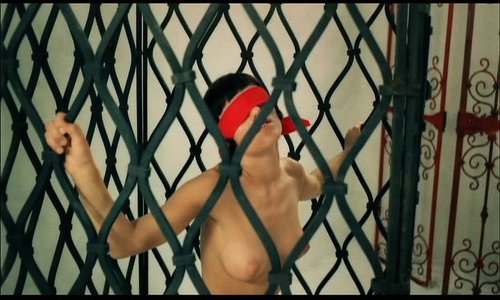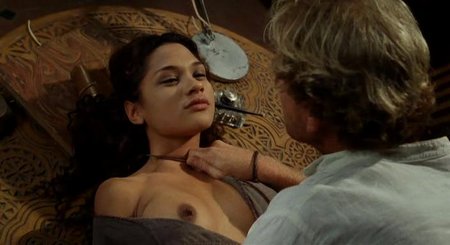ALAIN ROBBE-GRILLET’S ‘GRADIVA’
C’EST GRADIVA QUI VOUS APPELLE (GRADIVA)
Directed by Alain Robbe-Grillet
Starring James Wilby, Dany Verissimo, Arielle Dombasle
2006, Mondo Macabro
—————————-
When Robbe-Grillet died three years ago, I was high quality cialis unaware that this staple of surrealistic erotica was still making films as recently as 2006. A key figure in Pete Tombs’ obligatory eurotrash tome Immoral Tales, Alain Robbe-Grillet (1922-2008) was known as the writer of Alain Resnais’ mind-melding masterpiece Last Year at Marienbad before branching out to explore his own realm of luscious sado-masochistic fantastica as a director.
In Gradiva, A historian (coincidentally named John Locke) travels to Morocco to study recently unearthed sketches by the 19th century painter Delacroix. The mysterious drawings reveal an eroticism not apparent in much of Delacroix’ other work, leading Locke viagra cost with prescription to believe they are possibly frauds. In many of the drawings is a blonde woman in white, who the historian swears he’s seen dreamily roaming the alleyways of Marrakesh. But it’s impossible: the woman in the drawings was executed over a century earlier for having an illicit affair with a travelling foreigner – possibly Delacroix himself.
He is led to a gentlemen’s club called The Golden Triangle, a place where Westerners congregate to participate in illegal pleasures. The sketchy owner bills it as a finishing school for disobedient women, aimed at turning them into models and muses canadian online pharmacy no prescription needed for the arts. As with all of Robbe-Grillet’s work, the film is brimming with exotic, nubile young women, and The Golden Triangle offers a means of putting them on display in marvellous tableaux that recall the work of the painter at the core of the film’s obsessions (as well as some setpieces lifted right out of Robbe-Grillet’s Eden and After (1970)). It’s a shame then, that the male lead (Merchant-Ivory regular James Wilby) is flaccid viagra no prescription and repellent in comparison. Overall the acting is harsh and tersely punctuated, a characteristic that colours most of Robbe-Grillet’s films from Trans-Europ-Express (1967) onward, but this sometimes offers the only comic reprieve from their heady complexities. 
Also typical of Robbe-Grillet is a preoccupation with cyclical compulsions, slavery and role-playing; as a result, Gradiva is full of doppelgangers and all the psychoanalytic mumbo jumbo such doubles imply. But, as Robbe-Grillet points out in the video buy cialis without a prescription interview that appears among the DVD extras, he likes to deny his audiences the stereotypical pleasures of an erotic film and instead deceive them with a critical distance that never allows them to fully engage with the characters. But this quality is what makes Robbe-Grillet’s films persevere: decry them as pretentious if you must, but there is much more going on than superficial titillation; they’re built for fans of The Evergreen Review more than Hustler.
While Robbe-Grillet is in company with Jean Rollin, Jess Franco and Fernando Arrabal as one of the most integral components of the lofty Sadean erotic boom of the early 70s, one can’t help but feel that his films belong to another era, that his aesthetic has been watered down by today’s standards of beauty. The film just seems inherently melancholic, because it is so out of place now. But perhaps his films always were.
 The DVD extras include cast and crew biographies, the theatrical trailer, production notes, and – most impressively – a rare video interview with Robbe-Grillet that has him discussing his audiences and critics, his themes, his views on erotica, censorship and more. Unfortunately his interviewer allows him to flit through these topics rather quickly, and for someone of his calibre it seems like a missed opportunity.
The DVD extras include cast and crew biographies, the theatrical trailer, production notes, and – most impressively – a rare video interview with Robbe-Grillet that has him discussing his audiences and critics, his themes, his views on erotica, censorship and more. Unfortunately his interviewer allows him to flit through these topics rather quickly, and for someone of his calibre it seems like a missed opportunity.
– Kier-La Janisse

 April 1, 2011
April 1, 2011  No Comments
No Comments



